I have a DQN agent, that receives a state composed of a numerical value indicating its position and a 2D array denoting the requests from a number of users.
My attempt of architecting the neural network was as described here.
The issue now is in the model.predict() method, it is written like this:
target_f = self.model.predict(state)
in the method:
def replay(self, batch_size): # method that trains NN with experiences sampled from memory
minibatch = sample(self.memory, batch_size)
for state, action, reward, next_state, done in minibatch:
target = reward
if not done:
target = (reward + self.gamma * np.amax(self.model.predict(next_state)[0]))
target_f = self.model.predict(state)
target_f[0][action] = target
self.model.fit(state, target_f, epochs=1, verbose=0)
if self.epsilon > self.epsilon_min:
self.epsilon *= self.epsilon_decay
Where the state can be (agentPosition, [[1, 0, 0], [0, 0, 0], [0, 1, 0], ...])
The shape of the state is (2, (11, 3)) if I have 11 users for example (which equals the number of rows in the 2D array of requests).
The error says:
ValueError: Failed to find data adapter that can handle input: (<class 'list'> containing values of types {"<class 'numpy.int32'>", '(<class \'list\'> containing values of types {"<class \'numpy.ndarray\'>"})'}), <class 'NoneType'>
If instead I write it like this:
target_f = target_f = self.model.predict(np.array([state[0], state[1]]))
The error is then different:
ValueError: Error when checking model input: the list of Numpy arrays that you are passing to your model is not the size the model expected. Expected to see 2 array(s), for inputs ['dense_63_input', 'input_20'] but instead got the following list of 1 arrays: [array([[54],
[((1, 0, 0), (0, 0, 0), (0, 0, 1), (0, 0, 1), (0, 0, 0), (0, 1, 0), (0, 0, 1), (0, 0, 1), (1, 0, 0), (1, 0, 0), (0, 0, 1))]],
dtype=object)]...
Edit: I did as indicated in the accepted solution, and I get this error:
IndexError Traceback (most recent call last)
<ipython-input-25-e99a46675915> in <module>
28
29 if len(agent.memory) > batch_size:
---> 30 agent.replay(batch_size) # train the agent by replaying the experiences of the episode
31
32 if e % 100 == 0:
<ipython-input-23-91f0ef2e2650> in replay(self, batch_size)
129 np.array(next_state[1]) ])[0])) # (maximum target Q based on future action a')
130 target_f = self.model.predict( [ np.array(state[0]), \
--> 131 np.array(state[1]) ] ) # approximately map current state to future discounted reward
132 target_f[0][action] = target
133 self.model.fit(state, target_f, epochs=1, verbose=0)
C:\Anaconda\envs\tensorflow\lib\site-packages\tensorflow_core\python\keras\engine\training.py in predict(self, x, batch_size, verbose, steps, callbacks, max_queue_size, workers, use_multiprocessing)
1011 max_queue_size=max_queue_size,
1012 workers=workers,
-> 1013 use_multiprocessing=use_multiprocessing)
1014
1015 def reset_metrics(self):
C:\Anaconda\envs\tensorflow\lib\site-packages\tensorflow_core\python\keras\engine\training_v2.py in predict(self, model, x, batch_size, verbose, steps, callbacks, max_queue_size, workers, use_multiprocessing, **kwargs)
496 model, ModeKeys.PREDICT, x=x, batch_size=batch_size, verbose=verbose,
497 steps=steps, callbacks=callbacks, max_queue_size=max_queue_size,
--> 498 workers=workers, use_multiprocessing=use_multiprocessing, **kwargs)
499
500
C:\Anaconda\envs\tensorflow\lib\site-packages\tensorflow_core\python\keras\engine\training_v2.py in _model_iteration(self, model, mode, x, y, batch_size, verbose, sample_weight, steps, callbacks, max_queue_size, workers, use_multiprocessing, **kwargs)
408 strategy = _get_distribution_strategy(model)
409 batch_size, steps = dist_utils.process_batch_and_step_size(
--> 410 strategy, x, batch_size, steps, mode)
411 dist_utils.validate_callbacks(input_callbacks=callbacks,
412 optimizer=model.optimizer)
C:\Anaconda\envs\tensorflow\lib\site-packages\tensorflow_core\python\keras\distribute\distributed_training_utils.py in process_batch_and_step_size(strategy, inputs, batch_size, steps_per_epoch, mode, validation_split)
460 first_x_value = nest.flatten(inputs)[0]
461 if isinstance(first_x_value, np.ndarray):
--> 462 num_samples = first_x_value.shape[0]
463 if validation_split and 0. < validation_split < 1.:
464 num_samples = int(num_samples * (1 - validation_split))
IndexError: tuple index out of range
The state[1] is a tuple like this ((1, 0, 0), (0, 1, 0), ...)
The shape of np.array(state[0]) is ().
The shape of np.array(state[1]) is (11, 3).
If I write:
self.model.predict( [ np.array(state[0]).reshape(-1,1), np.array(state[1]) ] )
It gives an error:
ValueError Traceback (most recent call last)
<ipython-input-28-e99a46675915> in <module>
28
29 if len(agent.memory) > batch_size:
---> 30 agent.replay(batch_size) # train the agent by replaying the experiences of the episode
31
32 if e % 100 == 0:
<ipython-input-26-5df3ba3feb8f> in replay(self, batch_size)
129 np.array(next_state[1]) ])[0])) # (maximum target Q based on future action a')
130 target_f = self.model.predict( [ np.array(state[0]).reshape(-1, 1), \
--> 131 np.array(state[1]) ] ) # approximately map current state to future discounted reward
132 target_f[0][action] = target
133 self.model.fit(state, target_f, epochs=1, verbose=0)
C:\Anaconda\envs\tensorflow\lib\site-packages\tensorflow_core\python\keras\engine\training.py in predict(self, x, batch_size, verbose, steps, callbacks, max_queue_size, workers, use_multiprocessing)
1011 max_queue_size=max_queue_size,
1012 workers=workers,
-> 1013 use_multiprocessing=use_multiprocessing)
1014
1015 def reset_metrics(self):
C:\Anaconda\envs\tensorflow\lib\site-packages\tensorflow_core\python\keras\engine\training_v2.py in predict(self, model, x, batch_size, verbose, steps, callbacks, max_queue_size, workers, use_multiprocessing, **kwargs)
496 model, ModeKeys.PREDICT, x=x, batch_size=batch_size, verbose=verbose,
497 steps=steps, callbacks=callbacks, max_queue_size=max_queue_size,
--> 498 workers=workers, use_multiprocessing=use_multiprocessing, **kwargs)
499
500
C:\Anaconda\envs\tensorflow\lib\site-packages\tensorflow_core\python\keras\engine\training_v2.py in _model_iteration(self, model, mode, x, y, batch_size, verbose, sample_weight, steps, callbacks, max_queue_size, workers, use_multiprocessing, **kwargs)
424 max_queue_size=max_queue_size,
425 workers=workers,
--> 426 use_multiprocessing=use_multiprocessing)
427 total_samples = _get_total_number_of_samples(adapter)
428 use_sample = total_samples is not None
C:\Anaconda\envs\tensorflow\lib\site-packages\tensorflow_core\python\keras\engine\training_v2.py in _process_inputs(model, mode, x, y, batch_size, epochs, sample_weights, class_weights, shuffle, steps, distribution_strategy, max_queue_size, workers, use_multiprocessing)
644 standardize_function = None
645 x, y, sample_weights = standardize(
--> 646 x, y, sample_weight=sample_weights)
647 elif adapter_cls is data_adapter.ListsOfScalarsDataAdapter:
648 standardize_function = standardize
C:\Anaconda\envs\tensorflow\lib\site-packages\tensorflow_core\python\keras\engine\training.py in _standardize_user_data(self, x, y, sample_weight, class_weight, batch_size, check_steps, steps_name, steps, validation_split, shuffle, extract_tensors_from_dataset)
2381 is_dataset=is_dataset,
2382 class_weight=class_weight,
-> 2383 batch_size=batch_size)
2384
2385 def _standardize_tensors(self, x, y, sample_weight, run_eagerly, dict_inputs,
C:\Anaconda\envs\tensorflow\lib\site-packages\tensorflow_core\python\keras\engine\training.py in _standardize_tensors(self, x, y, sample_weight, run_eagerly, dict_inputs, is_dataset, class_weight, batch_size)
2408 feed_input_shapes,
2409 check_batch_axis=False, # Don't enforce the batch size.
-> 2410 exception_prefix='input')
2411
2412 # Get typespecs for the input data and sanitize it if necessary.
C:\Anaconda\envs\tensorflow\lib\site-packages\tensorflow_core\python\keras\engine\training_utils.py in standardize_input_data(data, names, shapes, check_batch_axis, exception_prefix)
571 ': expected ' + names[i] + ' to have ' +
572 str(len(shape)) + ' dimensions, but got array '
--> 573 'with shape ' + str(data_shape))
574 if not check_batch_axis:
575 data_shape = data_shape[1:]
ValueError: Error when checking input: expected dense_42_input to have 3 dimensions, but got array with shape (1, 1)
